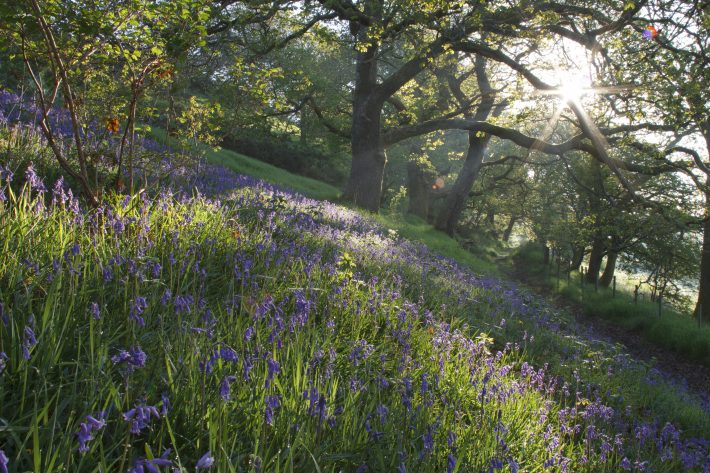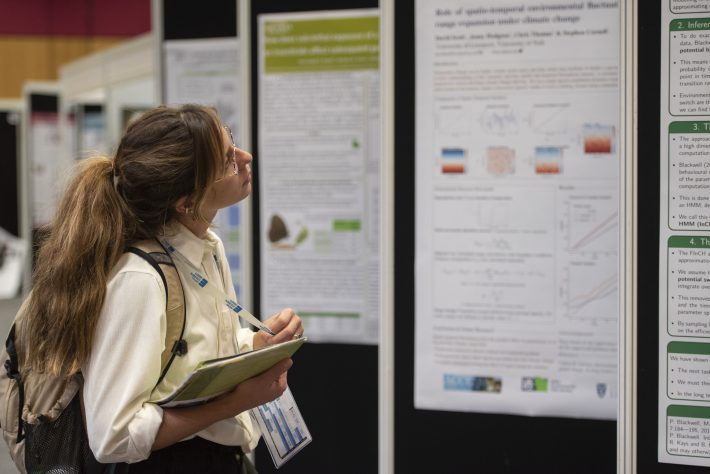Trees for Climate Change, Biodiversity, and People Agenda
Find out about our exciting line up of talks, posters, and social events!

The Trees for Climate Change, Biodiversity and People symposium is a 2 day event featuring a series of talks, posters and social events which aim to connect practitioners, academics and policy makers working to protect and restore our treescapes.
Registration has now closed.
Oral Presentations
Wednesday 28 June
| 09.45 - 10.30 | Welcome Plenary | Forrest Fleischman, University of Minnesota | |
| 10.30 - 15.00 | Culture, heritage and history of trees | ||
| 10.30 - 11.00 | Revealing the cultural histories of Scottish wooded landscapes: for restoration and engaging communities. | Coralie Mills, Dendrochronicle and Honorary Research Fellow at the University of St Andrews | |
| 11.30 - 12.00 | Using documentary film, meteorological data and historical records to understand the socio-ecological impacts of tree loss in Kano city. | Aliyu Salisu Barau, Bayero University, Kano | |
| 12.00 - 12.30 | The diversity of people’s relationships with biodiversity should inform woodland creation and restoration. | Zoe Davies, DICE, University of Kent | |
| 12.30 - 12.40 | Building cultural significance and connection through a national network of urban Tiny Forests – lessons learnt through engagement and citizen science. | Daniel Hayhow, Earthwatch Europe | |
| 12.40 - 12.50 | Restoration of ‘lost’ tree species: assessing cultural significance of and management options for elm species. | Fritha West, University of St Andrews and Centre for Forest Protection | |
| 13.50 - 14.00 | NWO: Deconstructing the apparent ‘New Woodland Order’ – a culture of polarisation between scientists, foresters and conservationists. | Chris Nichols, Woodland Trust | |
| 14.00 - 14.10 | Aesthetics of urban treescapes as a way to people’s better wellbeing. | Tarja Rannisto, Natural England, University of Sheffield | |
| 14.10 - 14.20 | Trees, Carbon and the Psychology of Landscapes. | Lindsey Gillson, Plant Conservation Unit, University of Cape Town, South Africa | |
| 14.20 - 14.30 | Creating a Legacy - a network of Tiny Forests and the Commonwealth Games Forests. | Adrienne Bennett, Severn Trent | |
| 14.30 - 15.00 | Panel discussion | ||
| 15.30 - 17.10 | Tree Health (part 1) | ||
| 15.30 - 16.00 | State of the UK's Tree Health: What can citizen science tell us? | Rebecca Gosling, Woodland Trust | |
| 16.00 - 16.30 | The role of social science and humanities in understanding tree health and biosecurity: identifying issues and developing solutions. | Julie Urquhart, Countryside & Community Research Institute, Uni of Gloucestershire | |
| 16.30 - 16.40 | Consequences of climate matching for oak resistance to herbivory. | Juri Alexander Felix, Royal Holloway University of London, Royal Botanic Gardens Kew | |
| 16.40 - 16.50 | Predicting forest damage using relative abundance of multiple deer species and national forest inventory data. | Colin Brock, University College Dublin (UCD) | |
| 16.50 - 17.10 | Panel discussion | ||
| 17.10 - 18.30 | Poster session | ||
Thursday 29 June
| 09.30 - 11.00 | Tree Health (part 2) | ||
| 09.30 - 10.00 | Tree health and biosecurity: when communication is the weakest ring. | Lucio Montecchio, University of Padova | |
| 10.00 - 10.10 | Integrating Epidemiology and Stakeholder behaviour in ash treescapes. | Vasthi Alonzo Chavez, Rothamsted Research | |
| 10.10 - 10.20 | How resilient are our native woodlands to multiple pests and pathogens? | Ruth Mitchell, The James Hutton Institute | |
| 10.20 - 10.30 | Collaboratively designing and delivering a new policy initiative to enable land managers to respond to tree health threats. | Harry Marshall, Forest Research | |
| 10.30 - 10.40 | What happens to ecosystems when trees die? A story of ash dieback. | Cecilia Dahlsjö, University of Oxford | |
| 10.40 - 11.00 | Panel Discussion | ||
| 11.30 - 15.30 | 30 x 30 & landscape restoration | ||
| 11.30 - 12.00 | Kunming-Montreal Global Biodiversity Framework – what’s in it for trees? | Andy Stott, Independent (formerly Defra) | |
| 12.00 - 12.30 | Monitoring the delivery of ecosystem services from woodland creation & landscape restoration. | Cat Scott, University of Leeds | |
| 12.30 - 13.00 | Economic incentives for woodland creation and their impacts on biodiversity. | Nick Hanley, University of Glasgow | |
| 14.00 - 14.10 | Assessing the use of natural colonisation to create new forests within temperate agriculturally dominated landscapes. | Matt Guy, Forest Research | |
| 14.10 - 14.20 | The sound of restoration: How site and landscape factors affect soundscape complexity in restored woodland. | Ross Barnett, University of Stirling | |
| 14.20 - 14.30 | Scenarios of treescape expansion for a net-zero land sector: how achievable are top-down scenarios at a local scale? | Melissa Minter, RSPB | |
| 14.30 - 14.40 | Operationalising functional connectivity to target and measure nature recovery at landscape scales. | Ewan Mchenry, Woodland Trust | |
| 14.40 - 14.50 | Delivering on conservation, restoration and poverty alleviation goals in Indonesia’s community forests. | Matthew Struebig, DICE, University of Kent | |
| 14.50 - 15.00 | Growing the Future: how the nation's forests will meet society's challenges. | Eleanor Tew, Forestry England | |
| 15.00 - 15.30 | Panel discussion | ||
| 16.00 - 16.20 | Youth Plenary | Laura Kravac and Dom McWilliams, Action for Conservation | |
| 16.20 - 16.50 | Closing remarks | Yadvinder Malhi, University of Oxford | |
Poster presentations

In addition to our line up of speakers there will be posters on display throughout the event with a dedicated poster session on Wednesday 28 June.
Social events

Right of Way screening + Q&A
19:00, Tuesday 27 June
Gulbenkian arts centre
Right of Way is a new feature-length programme that mixes stunning new artists’ commissions with historical archive films that give a bigger picture of questions of access and inclusion in the UK countryside. The event is free, but please register to guarantee a place.

BBQ Under the Stars
19:00, Wednesday 28 June
University of Kent grounds (please note the venue is subject to change depending on the weather)
Join us in the beautiful grounds of the University of Kent for an evening of food, music and games following the first day of the conference. This is a pre-paid ticketed event. Pick up your wristband from the Registration Desk which will give you entry to the event, food, and a couple of drinks. There will also be a cash bar.
Registration for the BBQ is now closed. If you would like to book, please contact events@britishecologicalsociety.org.

Woodland Wake-up Walk
08.00, Thursday 29 June
Meet underneath the Treaty Canoe in the Keynes main foyer
Begin day two with a one-hour gentle guided walk around campus. Local academic, William Rowlandson, will lead the way, introducing you to the local trees and talking about their history.
You will be back in time to the Sibson to grab a coffee and join the first session of the day.
Getting to the University of Kent
The symposium will be taking place in the Sibson Building on the University of Kent campus.
Getting here by train
There are frequent, high speed train services to Canterbury from St Pancras International. There are also direct services from London Victoria, London Charing Cross, Ebbsfleet International and Ashford International.
Getting here by foot from the stations
From Canterbury East: This station is approximately a 45-minute walk from the campus. You can view the journey on Google Maps.
From Canterbury West: This station is approximately a 25-minute walk from the campus. You can view the journey on Google Maps. You will turn left out of the station and continue past the ‘Goods Shed’ market on your left. After the roundabout, take the footpath on the left and take the subway under the railway line. The University is signposted on blue signs from here. The walk is up a slight hill.
Getting here by bus
Outside of term time, Stagecoach operates two services from central Canterbury to the University of Kent campus: the UNI1V and Triangle services. Both can be picked up from Canterbury Bus Station as well as from Westgate Towers, near Canterbury West station (turn right when leaving the station and walk to the main road, cross the road and take the bus going up the hill). The UNI1 and UNI2 buses do not run outside of university term time. For more information on getting here by bus, please visit the Transport Stagecoach bus travel page.
Getting here by coach
The 022 National Express service operates to Canterbury Bus Station and our campus Keynes bus stop. For more information on getting here by coach, please visit the Transport coach travel page.
Like what we stand for?
Support our mission and help develop the next generation of ecologists by donating to the British Ecological Society.